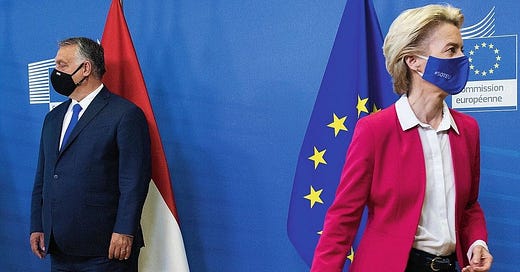What led the Commission to freeze €7 billion of Hugary's Recovery money
Last week's decision by the Commission to block Hungary's Recovery money, and to propose its extension to the regular EU funds that the country receives each year is the ultimate step of a year-long feud between Viktor Orban’s anti-European leadership and Ursula von der Leyen's increasingly political governance.
A procedure over rule of law abuses
As early as 2021, the Commission started a procedure against Hungary over rule of law abuses. It is no secret that Viktor Orban’s government is outrightly anti-European and has been playing an influence game with Brussels.
After the closing of most liberal academies in the country, blatant corruption issues, and the introduction of discriminatory legislation against LGBT people, migrants, or women, the Commission decided to step in and impose the primacy of EU laws.
The European executive decided not to approve Hungary’s recovery plan until these questions can be resolved. To this day, Hungary remains the only EU country that never received a cent of the NextGenerationEU plan.
Hungarian sham proposals
In August, the Hungarian government announced that it had replied to European Commission’s demands in order to unlock the billions of euros of recovery funds. It proposed more than 10 points that it would adopt by the end of October if an agreement is reached.
Among these propositions, Hungary would create an anti-corruption authority and a working group involving non-government organisations to oversee the spending of European Union funds.
Many observers considered these proposals as bad faith, as the government had actually no plan of carrying them forward. Even if it did, they would have amounted to limited results.
Will they? Won’t they?
In September, the Commission hinted that it could reduce the funds allocated to Hungary for recovery, due to the country’s systemic corruption problems. Budget Commissioner Johannes Hahn complained about the “systemic inability, failure or unwillingness, on the part of the Hungarian authorities, to prevent decisions that are in breach of the applicable law, as regards public procurement and conflicts of interest, and thus to adequately tackle risks of corruption.”
In addition, the European Parliament voted in September a resolution recognising that Hungary cannot be considered a democracy anymore.
Yet, the consensus in Brussels was that the Commission would give Hungary nothing more than a formal slap on the hands before handing over the much-desired recovery money.
You see, at that time, pro-Russia Viktor Orban blocked all initiatives to increase the sanctions against the Ukrainian attacker. The Hungarian premier effectively blackmailed the EU: give me my money or I’ll veto everything. A losing strategy.
No money, more problems
The European Commission finally decided on 23 November to suspend one-third of Hungary’s cohesion funds (€7.5 billion) and demanded to suspend the EU’s budget to Hungary until reforms were put in place.
This bold move was supported by the Parliament, thanks to a resolution calling the Commission to point, in its assessment, “the still existing risk […] against breaches of the principles of the rule of law in Hungary.”
What now?
The Council has until December 19 to “adopt, amend or reject” the Commission’s proposal, which will probably pass on 6 December, Politico reported this morning.





